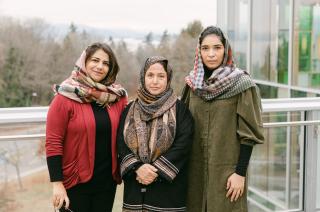
As a legal scholar focused on human rights, transnational law and business law, Dr. Sara Ghebremusse has long been interested in mining governance. In 2014, a lawsuit alleging that former Canadian mining company Nevsun Resources had used forced labour in Eritrea—Dr. Ghebremusse’s ancestral home—sparked her interest in understanding the involvement of Canadian mining companies in Sub-Saharan Africa.
Through her latest SSHRC-funded research project, the Anatomies of Two Canadian Mining Conflicts in Southern Africa, Dr. Ghebremusse is undertaking a comprehensive review of two Canadian mining companies and the conflicts involving them: Barrick Gold Corporation’s North Mara Mine in Tanzania and First Quantum Minerals’ operations in northern Zambia’s Copperbelt region.
The companies have been engaged in disputes both with the local communities affected by their projects, as well as with the Tanzanian and Zambian governments. Dr. Ghebremusse’s project will study both the local and national aspects of these conflicts to better understand the extent to which these disputes have transformed mining governance and altered state practice in Tanzania and Zambia.
“The reason that I wanted to take a closer look at these two mining conflicts is because they have similarities—taking place at the site level, but also involving a tax dispute with their national governments,” Dr. Ghebremusse explains. “I also think that these two conflicts present some very interesting facts and demonstrate changes in the way that the two African governments went about governing the projects, the mines, and mining generally, as a result of these conflicts.”
I'm hoping that this research contributes to that policy conversation, and maybe helps push the conversation, to continue to move it forward and urge the Canadian government to actually regulate the operations of mining companies overseas.
To date, much of the scholarship on mining governance in Africa has examined how a lack of good governance can foster conflict, but the ways in which these conflicts shape mining governance in African countries—for better or worse—is not fully understood. Through her research, Dr. Ghebremusse will provide a detailed overview of how mining conflicts have affected governance, and whether they have led to reforms. “We are aware that Canadian mining has a significant presence in Sub-Saharan Africa, but the extent to which that presence is actually shaping governance and the way in which these African countries are relating to Canadian mining companies and the local communities has yet to be fully studied and examined,” she adds.
Dr. Ghebremusse will be expanding upon her previous research examining state actions and state responses to mining governance as a developmental tool. “A lot of scholarship and discourse around the ways in which Canadian extractive companies are operating in the Global South with relative impunity has, for the most part, focused on their activities in Latin and South America. Similar coverage of the way in which they are operating to the same extent in Sub-Saharan African states has not been provided so far,” Dr. Ghebremusse explains. “I am looking to take my research there right now, using these two specific case studies as a way to illuminate some of the operations of Canadian mining companies in Sub-Saharan Africa.”
She says it’s her hope that this new project will contribute to ongoing policy discussions about how the Canadian government should regulate Canadian mining companies abroad, instead of relying on host governments to do so.
“There have been multiple efforts through legislation, and there is ongoing advocacy from civil society to urge Canada to better regulate the operations of its companies overseas,” she says. “I'm hoping that this research contributes to that policy conversation, and maybe helps push the conversation, to continue to move it forward and urge the Canadian government to actually regulate the operations of mining companies overseas. I want this research to have an impact on the policy discussion, and I want it to have an impact on the industry conversation and further shed light within the industry itself on its operations overseas.”


